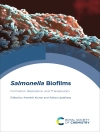The two volumes included in Antimicrobial Drug Resistance, Second Edition is an updated, comprehensive and multidisciplinary reference covering the area of antimicrobial drug resistance in bacteria, fungi, viruses, and parasites from basic science, clinical, and epidemiological perspectives. This newly revised compendium reviews the most current research and development on drug resistance while still providing the information in the accessible format of the first edition. The first volume, Antimicrobial Drug Resistance: Mechanisms of Drug Resistance, is dedicated to the biological basis of drug resistance and effective avenues for drug development. With the emergence of more drug-resistant organisms, the approach to dealing with the drug resistance problem must include the research of different aspects of the mechanisms of bacterial resistance and the dissemination of resistance genes as well as research utilizing new genomic information. These approaches will permit the design of novel strategies to develop new antibiotics and preserve the effectiveness of those currently available. The second volume, Antimicrobial Drug Resistance: Clinical and Epidemiological Aspects, is devoted to the clinical aspects of drug resistance. Although there is evidence that restricted use of a specific antibiotic can be followed by a decrease in drug resistance to that agent, drug resistance control is not easily achieved. Thus, the infectious diseases physician requires input from the clinical microbiologist, antimicrobial stewardship personnel, and infection control specialist to make informed choices for the effective management of various strains of drug-resistant pathogens in individual patients. This 2-volume set is an important reference for students in microbiology, infectious diseases physicians, medical students, basic scientists, drug development researchers, microbiologists, epidemiologists, and public health practitioners.
Cuprins
History of Drug-Resistant Microbes.- Evolutionary Biology of Drug Resistance.- Pharmacology of Drug Resistance.- Drug Development for Drug-Resistant Pathogens.- Genetic Mechanisms of Transfer of Drug Resistance.- Mutations as a Basis of Antimicrobial Resistance.- Altered Drug Targets.- Enzymatic Modification of Drugs.- Reduced Drug Penetration.- Active Efflux Mechanism.- Biofilms.- Beta-Lactamases.- Penicillin Binding Proteins.- Aminoglycosides.- Tetracyclines and Chloramphenicol Quinolones.- Plasmid Mediated Quinolone Resistance to Macrolides, Lincosamides, and Streptogramins.- Mechanisms of Resistance in Metronidazole.- Glycopeptide-resistance in eneterococci.- Daptomycin Resistance.- Oxazolidinones.- Polymyxins Sulfonamides and Trimethoprim.- Antimycobacterial Agents.- Amphotericin (Polyenes).- Azoles.- Flucytosine.- Echinocandins.- Antifungal Targets, Mechanisms of Action, and Resistance in Candida albicans.- Herpes Nucleoside Drugs.- Influenza Drugs.- HIV Nucleoside Drugs.- HIV Non-Nucleoside Drugs.- HIV Protease Inhibitors.- HIV Entry Inhibitors.- HIV Integrase Inhibitors.- Hepatitis B.- Hepatitis C.- Agents for anaerobic protozoa.- Antimalarial Agents.- Agents for Leishmania.- Agents for Trypanosomes.- Agents for Toxoplasma.- Agents for Cryptosporidium.- Agents against Nematodes.- Agents against Trematodes and Cestodes.- Agents against Ectoparasites.
Despre autor
Douglas L. Mayers is an infectious diseases specialist and is currently Chief Medical Officer (CMO) at Cocrystal Pharma. Dr. Mayers received his M.D. from University of Pennsylvania and has over 20 years of medical and clinical development experience spanning all phases of global clinical research and development and commercialization. He has worked with the United States Army Medical Research Institute of Infectious Diseases to discover and develop drugs against the Ebola virus. He has also served as the Head of HIV Clinical Studies Program and Department of HIV Disease Prevention at the Walter Reed Army Institute of Research and Naval Medical Research Institute. Previously, he was the Chief Medical Officer and Executive Vice President at Idenix Pharmaceuticals, where he directed the Infectious Disease programs and led numerous regulatory filings globally, including successful advancement of several anti-HCV candidates to the clinical phase. Prior to Idenix, he was the International Head/Vice President of the Virology Therapeutic Area at Boehringer Ingelheim where he led Phase 1 through 4 clinical studies for HIV and hepatitis programs. In addition to his extensive expertise in the industry and in research, Dr. Mayers is well-known in the academic sphere and is the author of over 95 peer-reviewed publications and book chapters.












